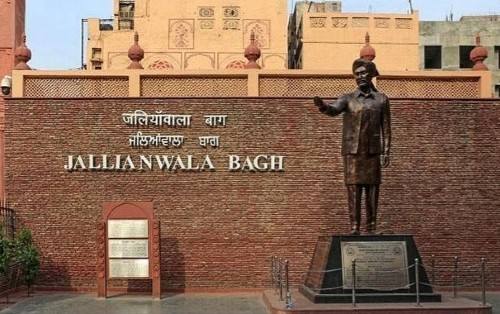The Jallianwala Bagh Massacre took place 105 years ago on April 13, 1919. Prime Minister Narendra Modi paid tribute to the martyrs and shared his speech on X (formerly twitter).

The Jallianwala Bagh Massacre took place 105 years ago on April 13, 1919. Colonel Reginald Dyer ordered firing on the peaceful crowd and hundreds of men, women, elderly and children died that day. It was one of the darkest days in history of India.
Prime Minister Narendra Modi paid tribute to the martyrs and shared his speech on X (formerly twitter).
Also Read:- Kangana Ranaut Calls Subhash Chandra Bose India’s First Prime Minister
“On behalf of my family members across the country, I pay my heartfelt tribute to all the brave martyrs of the Jallianwala Bagh massacre,” PM Modi tweeted.
Jallianwala Bagh Massacre:- What happened in Amritsar on April 13, 1919?
British government imposed draconian Martial Law to ban public gatherings. People unknown to this, gathered peacefully in Jallianwala Bagh on April 13, 1919.
Some people were there to celebrate the festival of Baisakhi and some people gathered in the Bagh (garden) to protest against the arrest of pro-Indian Independence leaders Dr. Saifuddin Kitchlew and Dr. Satya Pal.
When Colonel Reginald Dyer got to know about the gathering, he reached there with his 50 British Indian army troops. They had armoured and machine guns.
Colonel Dyer blocked the exit gates of Jallianwala Bagh. Without any warning to the crowd, he ordered his troops to begin shooting toward the crowd.
The firing went on for about 10 to 15 minutes and around 1650 rounds of bullets were fired.
Hundreds of people had died on the spot while some people jumped into the well to protect themselves from the firing. Many dead bodies were found from the well.
Also Read:- Meet India’s Newest Billionaire Renuka Jagtiani: The Woman Who Built a Retail Empire
Impact of Jallianwala Bagh Massacre
The first Asian Nobel laureate Rabindranath Tagore refused to accept ‘Knighthood’ after the Jallianwala Bagh Massacre.
Mahatma Gandhi also returned the ‘Kaiser-i-Hind’ honour and gave a call for non-cooperation movement.
Revenge of Jallianwala Bagh Massacre
Shaheed Udham Singh, who was a member of the revolutionist Ghadar party, shot Colonel Reginald Dyer on March 13, 1940 and took the revenge of Jallianwala Bagh Massacre.
